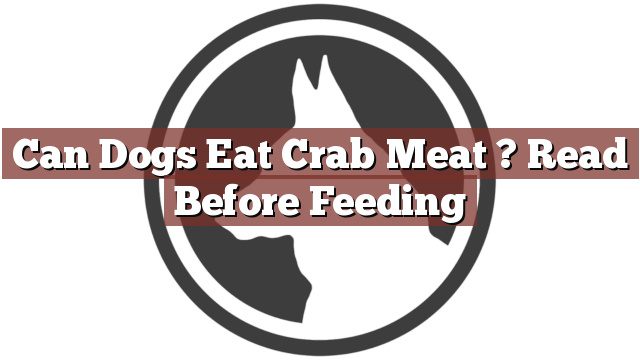Understanding Your Dog’s Dietary Needs
As responsible pet owners, it is crucial to understand and meet the dietary needs of our dogs. While it’s natural for them to be curious about our food, it’s important to be cautious when introducing new items into their diet. A well-balanced, nutritious diet is vital for their overall health and well-being. It’s essential to consult with a veterinarian before making any significant changes to your dog’s diet, including the addition of new foods like crab meat.
Can Dogs Eat Crab Meat? Read Before Feeding
Can dogs eat crab meat? This is a common question amongst dog owners who may be tempted to offer a taste of this seafood delicacy to their furry friends. The answer is yes, dogs can eat crab meat, but it should be given in moderation and prepared in a specific manner. Crab meat can be a good source of protein and essential nutrients for dogs, but there are some precautions that need to be taken.
Pros and Cons of Feeding Crab Meat to Your Dog
Feeding crab meat to your dog can have both pros and cons. On the positive side, crab meat is a good source of lean protein, which is essential for muscle development and repair. It is also rich in omega-3 fatty acids, which promote a healthy coat and skin. Additionally, crab meat contains vitamins and minerals like vitamin B12, zinc, and selenium, which contribute to overall good health.
However, there are also potential downsides to feeding crab meat to your dog. Crab meat can be high in sodium, which can lead to health issues such as increased blood pressure and water retention. It is important to ensure that the crab meat is properly cooked, as raw or undercooked seafood can harbor harmful bacteria that may cause food poisoning in dogs. Furthermore, some dogs may have allergies or sensitivities to shellfish, so it’s crucial to monitor your dog for any adverse reactions after introducing crab meat into their diet.
In Conclusion: Considerations for Feeding Crab Meat to Your Dog
In conclusion, while dogs can eat crab meat, it should be given in moderation and prepared properly. Consulting with a veterinarian before introducing any new food into your dog’s diet is crucial to ensure their specific dietary needs are met. If you decide to feed your dog crab meat, make sure it is cooked thoroughly, free from seasoning, and served in small portions as an occasional treat. Monitor your dog for any signs of allergies or digestive issues, and discontinue feeding crab meat if any adverse reactions occur. Remember, the health and well-being of your furry friend should always be the top priority.
Thank you for taking the time to read through our exploration of [page_title]. As every dog lover knows, our furry friends have unique dietary needs and responses, often varying from one canine to another. This is why it's paramount to approach any changes in their diet with caution and knowledge.
Before introducing any new treats or making alterations to your dog's diet based on our insights, it's crucial to consult with a veterinarian about [page_title]. Their expertise ensures that the choices you make are well-suited to your particular pet's health and well-being.
Even seemingly harmless foods can sometimes lead to allergic reactions or digestive issues, which is why monitoring your dog after introducing any new food item is essential.
The content provided here on [page_title] is crafted with care, thorough research, and a genuine love for dogs. Nevertheless, it serves as a general guideline and should not be considered a substitute for professional veterinary advice.
Always prioritize the expert insights of your veterinarian, and remember that the health and happiness of your furry companion come first.
May your journey with your pet continue to be filled with joy, love, and safe culinary adventures. Happy reading, and even happier snacking for your canine friend!

